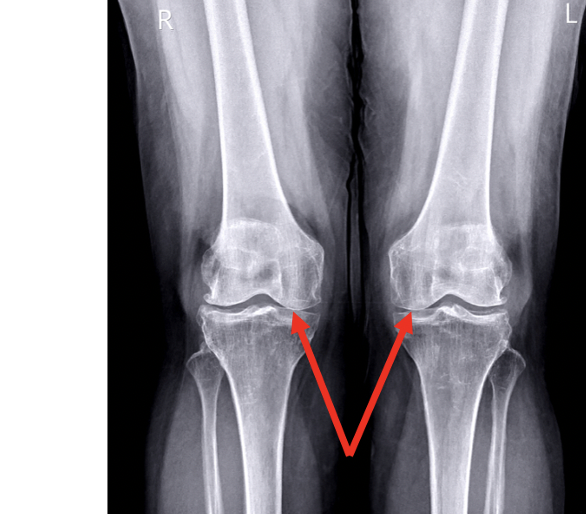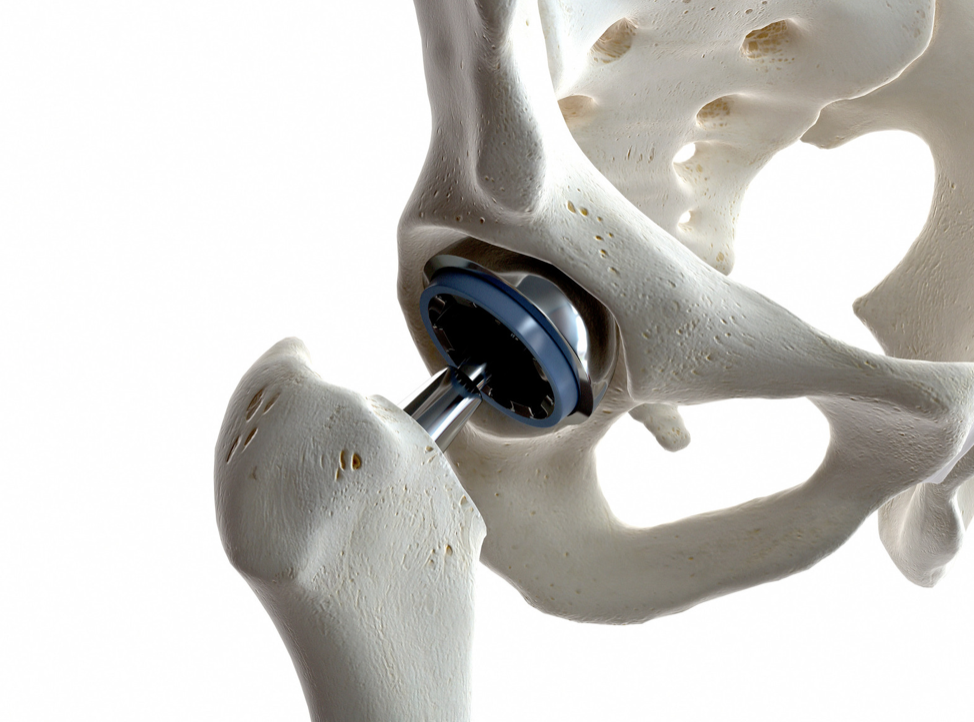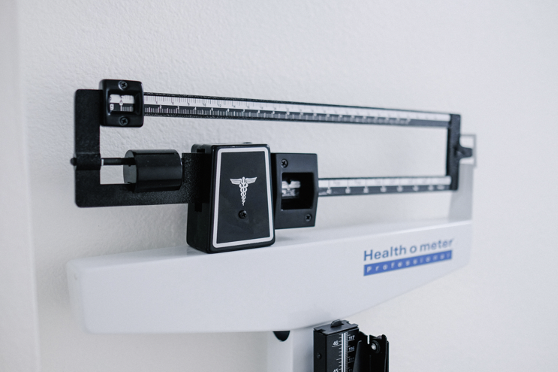Picture of a scale. How is my body weight related to the success or failure of my hip replacement or knee replacement? Image by NeONBRAND from Unslash.com
If you have been diagnosed with osteoarthritis in the hip or knee, you have likely been told by your doctor you may need a joint replacement now or in the future. You may have either already seen a surgeon about getting a joint replacement or already had a joint replacement. It is possible that at some point during the process the topic of your body weight may have come up. Maybe your family doctor suggested weight loss to help you manage your osteoarthritis. Or maybe the surgeon asked that you lose some weight before surgery. This may leave you wondering, “what does my weight have to do with my osteoarthritis and joint replacement?” This is a great question, and the truth is that your body weight has a lot to do with your hip and knee joint health!
What is BMI and how does body weight impact your joints?
The body mass index (BMI) is a way of estimating body fat by dividing a person’s body mass in kilograms by their height in metres squared. BMI is not a perfect measure but research shows that it does a good job of predicting body fat and a number of health risks.[10] The World Health Organization (WHO) has developed a classification system based on BMI. If your BMI is between 18.5 and 24.9kg/m2, you are at a healthy weight. Anything above 24.9 but less than 30 is classified as overweight. BMIs between 30 and 34.9 and between 35 and 39.5 are referred to as obese class I and II respectively. Obese class III, also known as severe or morbidly obese, is a BMI of 40 or greater.[1][10]
High BMI puts you at an increased risk of developing osteoarthritis, especially of the knee.[1][10] Obesity (BMI of 30 or greater) has also been known to speed up the progression of joint degeneration in osteoarthritis.[1] One of the reasons for this is that the increase in body weight leads to increased load on the knee. This is to the extent that if an individual loses 1 lb of body weight, it results in a 4-fold decrease in load on the knee during day-to-day activity![10]

Image by mr.suphachai praserdumrongchai from Canva.com
How is BMI related to the need for a hip or knee replacement?
Given the impact of BMI on joint loading and osteoarthritis, there is no surprise that with the increasing rates of obesity world-wide, the rates of hip replacement and knee replacements are also on the rise.[10] The WHO estimates that over 10% of the world’s population has a BMI score of at least 30, and are therefore considered obese.[1] Obesity is not only increasing the risk of needing a joint replacement, research suggests that it also leads to joint replacements at much younger ages, due to accelerated joint degeneration.[1][2]
For hip replacements, people who had a BMI of 30 or higher needed a hip replacement 1.7 years before people with a healthy weight. This jumped to almost 6 years earlier for people with a BMI of over 40 (classified as severely obese). The effect is even greater for knee replacements. For someone with a BMI over 30, they will need a knee replacement 2.7 years earlier than a person with a healthy weight, and with a BMI over 40 this increases to 7.6 years.[1] One study looked at what factors posed the greatest risk of needing a hip replacement or knee replacement in middle-aged women. They found that increasing height, weight and BMI all increased risk of needing a joint replacement, but BMI was the strongest predictor. They found that a BMI of 30 or higher led to 2.5 times the risk of needing a hip replacement and over 10 times the risk of needing a knee replacement.[8] These are important findings and really highlight the importance of maintaining a healthy weight, even if you have not yet been diagnosed with osteoarthritis or received a joint replacement.
How does BMI influence the outcome of hip replacement and knee replacements?
When looking at the success of joint replacement surgeries, it is important to consider immediate and long-term outcomes. One study found that people with BMI of greater than 30 that had joint replacements had a higher rate of infection, an increased risk of going to a rehab hospital instead of going home, and were more likely to have negative medical events while in the hospital for both hip replacement and knee replacements. In hip replacements (but not knee replacements) a BMI over 30 also led to longer stays in hospital and an increased likelihood of being readmitted within 30 days.[1] Another study also found that increased BMI also led to an increased risk of bacterial infection during a joint replacement.[3]
Having a BMI over 30 does not seem to lead to an increased rate of dislocation in the replaced joints or fracture close to joint replacement.[1] It has also been found that there is no increased risk of having to have your hip replacement or knee replacement fixed or revised if you have a BMI over 30.[11] Functional recovery during the first 6 months after a knee replacement is also not dependent on BMI either.[10] These outcomes indicate that although having a BMI over 30 may lead to some short term risks, the overall outcomes of joint replacements are as good as in people who have a lower BMI lower than 25.
It is important to distinguish between individuals with a BMI over 30 and people with a BMI higher than 40. For people with a BMI over 40, the long term outcomes are still good, as pain is reduced and function increases [6], but the risk of serious complications such as severe infection, difficulty with healing of the wound, blood clotting in the leg (known as a deep vein thrombosis), and early failure of the replacement are all increased.[9] Does this mean that people with a BMI over 40 should not get a joint replacement? No, it does not because they still benefit from having the joint replaced!

Image by Science Photo Library from Canva.com
Should I try to lose weight before my joint replacement?
You may have been told that you should lose weight before your joint replacement surgery or that you could not have a joint replacement surgery until you reached a certain weight. Whether this was justified depends on a number of factors but I will answer the question of “Should I try to lose weight before my joint replacement?” differently for two groups of people.
If you have a BMI greater than 30 but less than 40, your weight may pose some increased risk of complications after surgery, but overall the outcome of joint replacements are good for people of your body composition.[4] There are reasons your surgeon may not want to replace your joint such as increased length of the procedure [4] and increased complexity of the procedure.[3] But if there are no other risks based on your medical history, it is likely in your best interest to get your joint replaced if it is causing you significant pain and loss of function. However, it is recommended that you try physical therapy before getting to this point, as it will only help with preparation for surgery if it is needed.
One study found using a low energy diet for 8-weeks before joint replacement led to a 10% decrease in weight, lowered cardiovascular risk factors, and improved body fat percentage, however it did not impact functional outcomes a year after surgery.[7] So, although you do not need to lose weight before a joint replacement if your BMI is between 30 and 40, it would be beneficial for you to do so for a number of reasons beyond just the success or failure of your joint replacement, as there are a number of health risks related to a BMI this high. We've written a great blog about food recomendations and foods to avoid before a knee replacement that also applies to a hip replacement.
If you have a BMI of greater than 40, your risks of complications from a joint replacement surgery are much higher.[9] But you would still benefit from the replacement.[6] Weight loss is encouraged and a small decrease in weight can make a big difference. In some cases, weight loss surgery may be recommended. A study found that in people who were recommended to have both weight loss surgery and a knee replacement, the outcomes were significantly better if the weight loss surgery was performed first.[5] This is something that can be discussed with your family doctor or surgeon.
Conclusion
Body Mass Index or BMI is an important consideration when it comes to joint health. A BMI over 30 increases your risk of developing osteoarthritis and needing a hip replacement or knee replacement as a result. It also leads to people needing joint replacements at a younger age. Individuals with a BMI over 30 but less than 40 may be more likely to have short term complications from a hip replacement or knee replacement, such as infections, but the long term improvements in pain and function are similar to people with a BMI below 25 (categorized as a healthy weight).
People who have a BMI over 30 but less than 40 would benefit from weight loss in general, but it is likely not necessary to have a successful joint replacement. However the risk of severe complications of people who have a BMI of greater than 40 are greater. People with a BMI over 40 would benefit from losing weight before surgery and should be considered for weight loss surgery before getting their knee replacement. That being said, they still benefit from joint replacements and should not be denied this option.
Regardless of your BMI, if you get a hip replacement or knee replacement Curovate can help you. The Curovate mobile app has rehabilitation protocols for both hip replacement and knee replacement surgeries, to help you have the best possible outcome.
If you need further customized assistance during your surgery or injury recovery check out our Virtual Physical Therapy page to book your 1-on-1 video session with a physical therapist.
 |
 |
|---|
Other Blogs Related to Joint Replacement
- Why does my knee feel weird after my total knee replacement? Why does my knee feel heavy after my total knee replacement?
- My surgeon said I have knee osteoarthritis but I don’t have pain - should I get a knee replacement?
- What is a total knee replacement?
- Is it normal to still have pain after a knee replacement surgery?
- Should I exercise before my total knee replacement?
- What is Osteoarthritis?
- How long will my knee replacement last? And is there anything I can do to make my knee replacement last longer?
- 6 Things You Need to Know After A Total Knee Replacement
- 4 Tips to Prevent Falls After Knee Replacement, Hip Replacement And ACL Surgery
- Should I be experiencing pain when I do my rehabilitation exercises?
- Ankle Pumps - Why is my medical team telling me to do these?
- How to use crutches after injury or surgery - ACL, Knee Replacement, Hip Replacement
- Physical therapy advice after knee or hip surgery to keep up with your exercises! – Part 1
- How To Use Your Walker Safely After Knee Replacement or Hip Replacement Surgery







